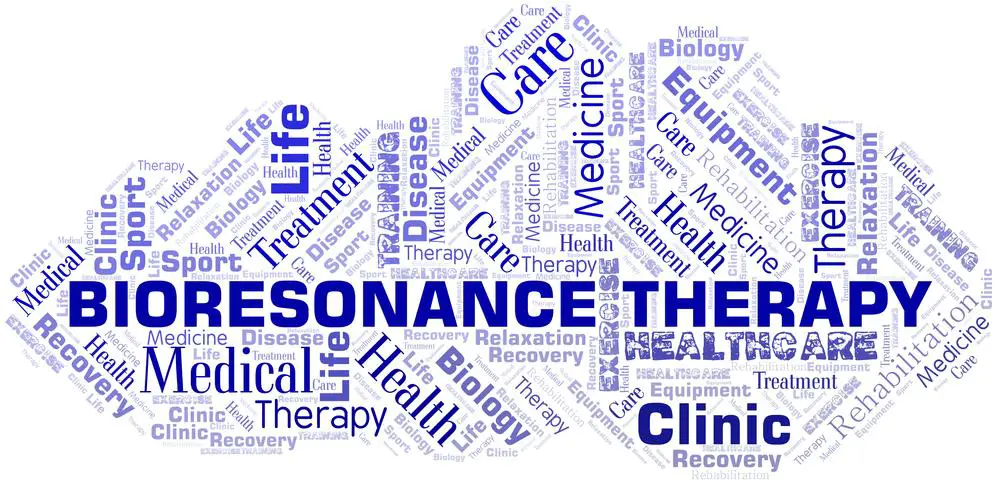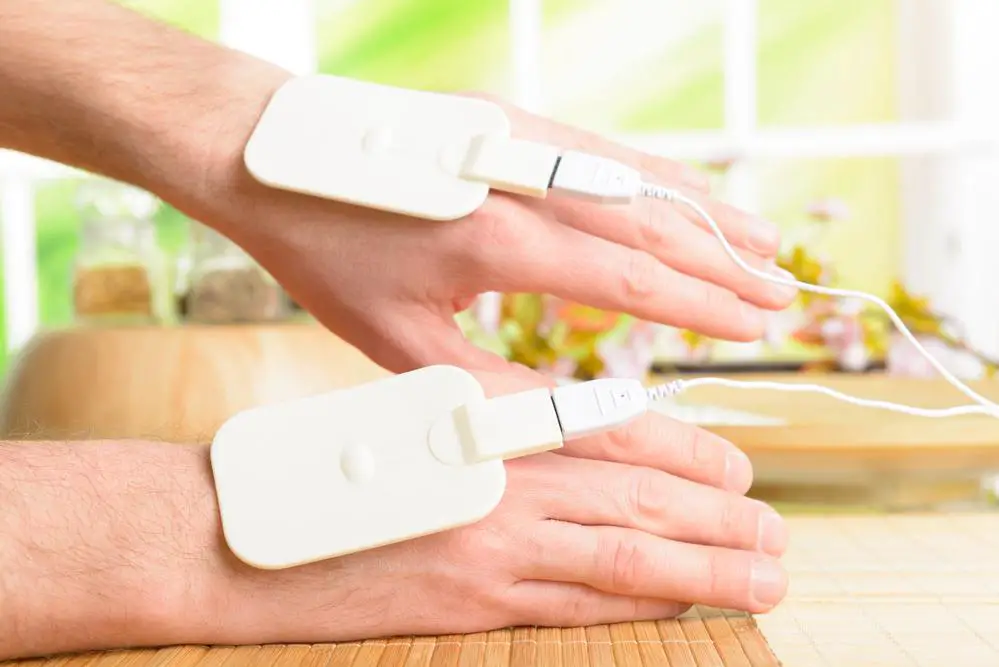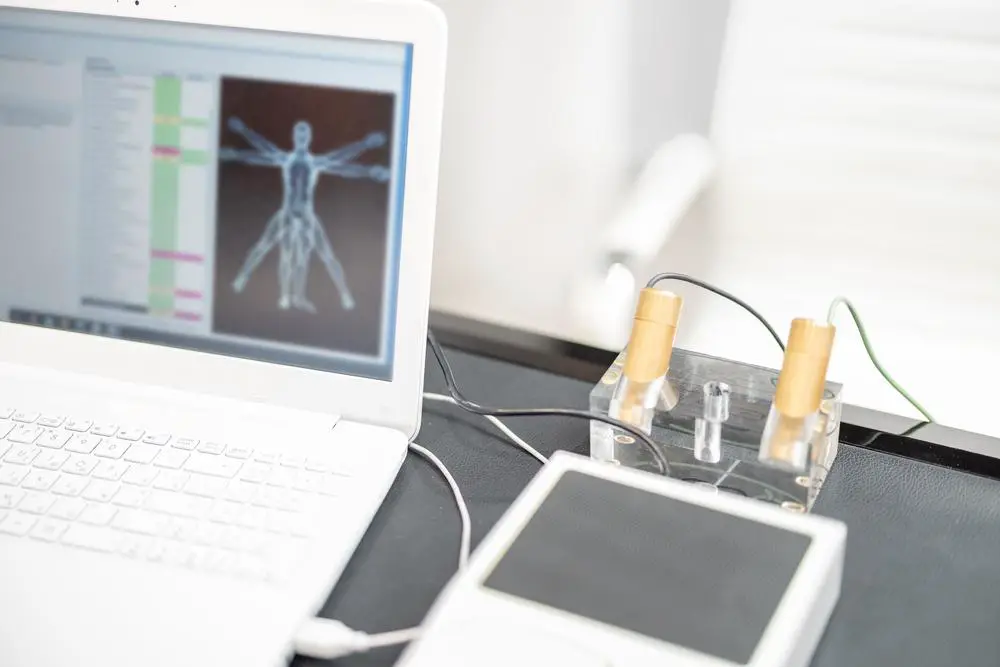As a BetterHelp affiliate, we receive compensation from BetterHelp if you purchase products or services through the links provided
Bioresonance therapy is a holistic approach to health, aiming to restore balance within the body by using its frequency patterns. The therapy is based on the concept that every cell, organ, and system in the body has a unique vibration, often referred to as your body’s “chi” or energy. When illness occurs, these natural frequencies become disrupted, and bio-resonance therapy attempts to identify and correct these imbalances to promote healing.
The method used in bioresonance therapy involves using a specialized machine that measures the energy wavelengths from the body. It then compares these frequencies with those of healthy cells, allowing practitioners to identify any discrepancies and work to restore balance. This non-invasive technique has been utilized for various health concerns, including pain management, allergies, and mental health issues such as mild to moderate depression.
Key Takeaways
- Bioresonance therapy is a holistic approach to restoring balance within the body using its frequency patterns
- The therapy utilizes a specialized machine to measure the body’s energy wavelengths and identifies discrepancies in comparison to those of healthy cells
- This non-invasive technique has been applied to treat various health concerns, including pain management, allergies, and mental health issues
Basic Principles of Bioresonance

Bioresonance therapy is a non-invasive alternative treatment designed to work with your body’s natural frequencies. The underlying principle is that all particles of matter, including your cells, generate electromagnetic energy. This energy forms unique frequencies that can be influenced by various factors such as health and illness.
When you are in good health, your cells vibrate at their ideal natural frequency. However, if your health is compromised, the frequencies emitted by unhealthy cells or organs might get altered due to issues like DNA damage. Bioresonance therapy aims to detect and correct these imbalances in your body’s energy wavelengths.
The therapy uses a device that measures the energy wavelengths in your body and compares them against your body’s optimal energy frequencies. Once the device identifies any discrepancies, it sends beneficial wavelengths back to your body to restore the balance.
In summary, bioresonance therapy focuses on working with your body’s unique energy wavelengths to promote overall health and wellness. By identifying and addressing imbalances in your body’s electromagnetic frequencies, this therapy can help support your body’s natural healing processes. Remember, it’s essential to consult with a healthcare professional before considering any alternative therapies.
Historical Background
In the 1970s, a unique treatment method emerged in Germany, thanks to the collaboration between Dr. Franz Morell and engineer Erich Rasche. These two pioneers developed what is now known as bioresonance therapy, with the initial term for their therapy being MORA therapy – a combination of their surnames, MORell and RAsche.
MORA therapy was an innovative holistic treatment based on sound scientific theory. Dr. Morell, a physician, joined forces with Erich Rasche, an engineer, to develop a device to identify and treat imbalances in the body’s electromagnetic frequencies. The foundation of their therapy lies in the belief that every cell in the body has its specific electromagnetic frequency, and by correcting or normalizing these frequencies, various diseases could be treated.
As the therapy evolved, it became known as bioresonance or bio-physical information therapy. This modern approach has proven to help treat various issues such as stress, pain, anxiety, and more. The techniques used in bioresonance therapy process the electromagnetic information from the human body through sensitive devices like the Mora Nova, utilizing electrodes to aid in treatment.
Today, bioresonance therapy continues to capture attention in the alternative medicine field. With its historical roots in the groundbreaking work of Dr. Franz Morell and Erich Rasche, bio-physical information therapy offers a unique approach to treatment. It can potentially help people seeking relief from various health concerns.
Procedure and Equipment of Bioresonance Therapy
 In bioresonance therapy, a machine is employed to assess the energy wavelengths emitted by your body. As a gentle, non-invasive procedure, it addresses imbalances in your system by analyzing bio-energetic information.
In bioresonance therapy, a machine is employed to assess the energy wavelengths emitted by your body. As a gentle, non-invasive procedure, it addresses imbalances in your system by analyzing bio-energetic information.
During a session, electrodes are connected to various points on your body to facilitate the scanning and analysis. These electrodes act as receivers and transmitters, picking up on your body’s energetic frequency patterns and transmitting them back to the machine.
The technology employed in bioresonance therapy is usually a susceptible device, such as a Mora Nova or Bicom machine. These electronic devices are designed to detect abnormalities in your body’s energy patterns and help the therapist identify areas that need attention or treatment.
Once potential imbalances are detected, the machine will generate specific frequencies to normalize your body’s energy spectrum. These frequencies are transmitted back into your body via the electrodes, creating a continuous feedback loop between you and the technology during the session.
As a friendly reminder, it’s essential to approach bioresonance therapy with an open mind and realistic expectations. While it can offer insights into your overall health and well-being, it’s not a guaranteed cure-all. It’s always wise to consult a qualified healthcare professional before embarking on any new treatment journey.
Applications of Bioresonance Therapy
Bioresonance therapy is a holistic approach used by various healthcare practitioners, such as doctors, naturopaths, acupuncturists, and chiropractors, to address various health issues. In this section, we will discuss the different applications of bioresonance therapy, keeping a friendly tone to help you understand its benefits.
Allergies and Eczema: If you’re struggling with allergies or eczema, you may find relief through bioresonance therapy. By measuring the frequency of energy wavelengths coming from your body, practitioners can detect and address imbalances, which could alleviate allergy symptoms and improve your skin condition.
Arthritis: Arthritis sufferers may also benefit from bioresonance therapy. The treatment aims to target inflammation and relieve pain associated with arthritis. It’s a non-invasive procedure, so you don’t have to worry about the side effects and complications arising from medications or surgeries.
Asthma and Atopic Dermatitis: Bioresonance therapy can help manage respiratory issues like asthma or skin conditions like atopic dermatitis. As the therapy focuses on energy imbalances in your body, it may improve your overall condition and help you breathe easier or reduce skin irritation.
Smoking Cessation: If you’re trying to quit smoking, bioresonance therapy might be a helpful tool. It has been used to aid in smoking cessation by targeting the addictive substances in your body and working to remove or reduce their influence, ultimately helping you kick the habit.
Fibromyalgia: Bioresonance therapy might help manage fibromyalgia symptoms like widespread pain, fatigue, and cognitive difficulties. By balancing your body’s energy, the therapy could potentially improve these symptoms, allowing you to better cope with the daily challenges of living with fibromyalgia.
Overtraining Syndrome and Athletes: Lastly, athletes and active individuals at risk of overtraining syndrome may find bioresonance therapy beneficial. The therapy can help identify energy imbalances related to overexertion and help you take the necessary steps to aid recovery and optimize performance.
Remember that these are just a few of the many applications of bioresonance therapy. As with any alternative therapy, it’s essential to consult with a professional to determine if bioresonance therapy is right for you and your specific needs.
Scientific Evidence and Clinical Trials
You might be curious about the scientific evidence supporting bioresonance therapy. Clinical trials have been conducted to determine the effectiveness of this treatment method. In a study conducted on patients with mild and moderate depression, bioresonance therapy showed a more significant improvement when compared to selective serotonin reuptake inhibitor (SSRI) medication treatment.
When considering the evidence for bioresonance therapy, it’s essential to assess the various levels of scientific research conducted:
- Level 1: Statistically significant, randomized, controlled trials (double-blind studies) or meta-analyses.
- Level 2: Statistically insignificant, randomized, controlled trials (double-blind studies) or meta-analyses.
- Level 3: Prospective, controlled, but not randomized cohort studies.
- Level 4: Historic, not randomized cohort or case-control studies.
In the realm of cancer research, clinical trials have suggested that specific spectrums of radiofrequency electromagnetic energy can have antitumor effects on various types of cancer, such as hepatocellular carcinoma, breast cancer, ovarian cancer, thyroid cancer, and glioblastoma multiforme, without causing dangerous side effects.
Bioresonance therapy is regarded as a holistic physical treatment method, and studies are still being conducted to understand better the effectiveness and limitations of this therapy on mental health, cancer, and other conditions.
In summary, while some scientific evidence supports the effectiveness of bioresonance therapy, more research and randomized controlled studies are needed. Always consult your healthcare professional before pursuing alternative therapies to ensure they suit your needs and health concerns.
Speak to the Therapist
 Speaking to a therapist, especially a bioresonance therapist, can be an excellent way to understand better the treatment process, potential benefits, and any concerns you may have. When meeting with your therapist, they will assess your medical history, listen to your concerns, and collaborate to determine the most suitable course of action for your specific needs.
Speaking to a therapist, especially a bioresonance therapist, can be an excellent way to understand better the treatment process, potential benefits, and any concerns you may have. When meeting with your therapist, they will assess your medical history, listen to your concerns, and collaborate to determine the most suitable course of action for your specific needs.
It’s essential to be open and honest with your therapist about your symptoms, medical conditions, and expectations. This will help them tailor the therapy according to your unique requirements. Feel free to ask any questions, such as the duration of therapy sessions or potential side effects, to ensure you’re well-informed and comfortable with the treatment plan.
Bioresonance therapists, like other healthcare professionals, are bound by confidentiality. This means that the information you share with them about your health is kept strictly private. Furthermore, reputable therapists should have undergone appropriate training to offer bioresonance therapy effectively and safely to their patients.
Remember that communication is key in any therapeutic relationship. Regularly updating your therapist about the progress and changes in your health can help them adjust the therapy accordingly. Trusting your therapist and having a strong rapport will significantly enhance the success of your treatment.
Be patient during your bioresonance therapy journey. Progress might be slower than expected, and giving your body adequate time to adjust and respond to the treatment is crucial. Stay motivated and communicate with your therapist to ensure your overall well-being.
Potential Side Effects and Risks
When considering bioresonance therapy as a treatment for certain conditions, it’s essential to be aware of the potential side effects and risks associated with this therapy. This knowledge will help you make informed decisions for your well-being.
One possible side effect can be related to the electrical activity produced by the therapy itself. Though most people don’t feel anything during the treatment, some individuals may experience discomfort or sensitivity to the electrodes used in the therapy. However, these sensations are often minimal and can be managed by monitoring and adjusting the device settings.
While some studies suggest that bioresonance has been effective in treating mild to moderate depression, there is limited research on its effectiveness in treating anxiety. It’s essential to discuss your symptoms and concerns with your healthcare provider to determine if bioresonance is a suitable treatment option for you.
It’s important to note that the safety and effectiveness of bioresonance therapy for treating health conditions like cancer, allergies, arthritis, and chronic degenerative diseases are still under investigation. The available research is limited, and more studies are needed to understand its potential uses and risks fully.
There have been no reported instances of DNA damage caused by bioresonance therapy. However, staying informed about new research findings is crucial as the field continuously develops.
In conclusion, while bioresonance therapy may be an appealing alternative treatment option, it’s essential to be aware of the potential side effects and risks. Remember to consult your healthcare provider and gather comprehensive information before deciding your treatment options.
Regulatory Issues Surrounding Bioresonance Therapy
When exploring bio-resonance therapy, knowing the regulatory issues surrounding its use is essential. While this alternative therapy has gained some attention for helping with conditions such as mild to moderate depression, its effectiveness and safety are still under scrutiny.
In the United States, the Food and Drug Administration (FDA) has not approved bio-resonance devices to diagnose or treat any medical condition. As a result, if you come across a provider or a device manufacturer claiming FDA approval, exercise caution and investigate further before investing your time or money into the therapy.
The Advertising Standards Authority (ASA) regulates advertising claims for products and services in the United Kingdom. They have issued guidance on bio-resonance therapy, warning marketers to avoid making therapeutic or diagnostic claims without robust evidence. This means that promoters of bio-resonance devices and practitioners must ensure their advertising complies with these standards, and you should be wary of any claims that seem exaggerated or unfounded.
A consumer must use a critical eye when evaluating bio-resonance therapy options. While some studies suggest that bioresonance may have potential benefits, the lack of comprehensive research and regulatory oversight makes it essential to remain vigilant when considering this therapy. Be sure to consult with a healthcare professional before embarking on any new treatments, including bioresonance, and stay informed about the regulatory landscape to make the best decisions for your well-being.
Debate: Alternative Medicine or Scientific Practice
When exploring bio-resonance therapy, you might ask whether it is an alternative medicine or a scientific practice. It’s essential to clearly understand where it stands in the spectrum of medical treatments.
Bioresonance therapy is often classified as alternative medicine alongside other treatments like acupuncture, chiropractic, and vibrational medicine. These approaches typically fall outside conventional medical practices, yet many people find them beneficial for various health concerns.
Bioresonance aims to process the electromagnetic information of the human body using a sensitive device with electrodes. Some studies have suggested that it may help treat conditions like depression independently or as a complementary therapy alongside conventional treatments.
However, there is still considerable debate around the scientific validity of bio-resonance therapy. Evidence levels, as classified by the American Heart Association, play a crucial role in determining the credibility of any treatment method. While some studies support bioresonance, they might not always meet the highest levels of scientific rigor, such as statistically significant, randomized, controlled trials.
Additionally, the origins of bioresonance therapy contribute to the skepticism surrounding this method. Developed in Germany in the late 1970s by a member of the Scientology organization, it is hard for some to separate its questionable beginnings from its current scientific status.
So, as you navigate the debate between alternative medicine and scientific practice, it’s essential to consider various factors, including the evidence supporting a treatment, its origins, and its effectiveness with established methods. Ultimately, the choice of whether to pursue bioresonance therapy or other alternative treatments depends on your individual needs, preferences, and the guidance of qualified healthcare professionals.
Frequently Asked Questions
What is the cost of a bioresonance therapy machine?
The cost of a bioresonance therapy machine can vary depending on the make and model and the features it offers. Prices can range from a few hundred to several thousand dollars. Researching and comparing different options is essential to find a machine that suits your needs and budget.
Can I find bioresonance therapy information on Wikipedia?
Yes, you can find information about bioresonance therapy on Wikipedia. However, it’s essential to remember that anyone can edit Wikipedia, so it’s crucial to cross-check the information with other sources, like scientific journals, to ensure accuracy.
Are there any reviews available for bioresonance therapy?
There are reviews available for bioresonance therapy on the internet. While some people report positive experiences and health improvements, it’s important to note that the evidence supporting the effectiveness of bioresonance therapy is limited. Be sure to consult with your healthcare provider before starting any alternative therapies.
Is bioresonance therapy covered by the NHS?
Currently, bioresonance therapy is not covered by the NHS (National Health Service) in the UK. The NHS considers it an unproven treatment with insufficient scientific evidence to support its use. Patients interested in bioresonance therapy must seek treatment from private practitioners and cover the costs themselves.
Where can I get training for bioresonance therapy?
Training for bio-resonance therapy is available through various institutions and organizations specializing in alternative medicine. Choosing a reputable training provider is essential to ensure that you receive proper education in this technique. Some institutions may offer online courses, while others require in-person attendance.
How accurate is bioresonance testing?
The accuracy of bio-resonance testing is still a subject of debate among experts. Some studies have shown promising results, while others have found no significant difference between bio resonance therapy and placebo treatments. Due to limited research, it is difficult to determine its accuracy conclusively. Maintaining a critical perspective and consult your healthcare provider before relying on bio-resonance testing for medical diagnosis or treatment is crucial.
- Breaking the Silence: Why Men’s Mental Health Matters More Than Ever - April 15, 2025
- How to Transform a Home’s Patio Space into a Relaxing Space - March 23, 2025
- 5 Strategies to Use a Cell Phone to Help Manage Your Stress - March 23, 2025
This site contains affiliate links to products. We will receive a commission for purchases made through these links.


 Bioresonance therapy, traditionally known for addressing physical ailments, is increasingly recognized for its potential in mental health. This innovative approach offers a unique perspective on treating various mental health conditions, blending technology with holistic wellness principles.
Bioresonance therapy, traditionally known for addressing physical ailments, is increasingly recognized for its potential in mental health. This innovative approach offers a unique perspective on treating various mental health conditions, blending technology with holistic wellness principles.
